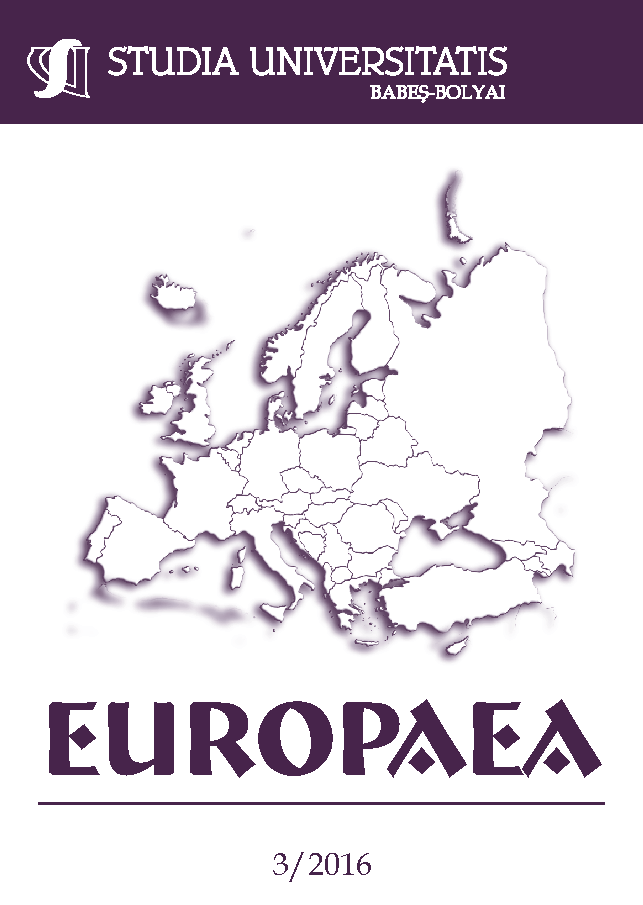THE MEMOIRS OF LENA CONSTANTE AND THE EXILE IN THE LABYRINTH / LES MEMOIRES DE LENA CONSTANTE ET L’EXIL AU LABYRINTHE
Keywords:
exile, labyrinth, memoirs, narrative, escapeAbstract
In the privileged space of the myths, Minos, the legendary king of Crete, captures the Minotaurus in a famous palace – a creation of Dedalus – which represents the primary model of the labyrinth and which implicitly determined, in the cultural history, a consacrated interception of this symbol, in its sense of space, recognizable in the terms of a configuration and of a peculiar dimension. The labyrinth, however, repeatedly abandons the condition of space, similar to the pendulum that can be detected (every time) in a different hypostasis within the successive becomings of its course. In this matter, distinct variants of the existence of the labyrinth can be evoked, diachronically catalogued by Paolo Santarcangeli (the dream, the game, the clothing, the poem, etc.) and can constitute the object of our concerns, through their own pendulation in the memoirs of Lena Constante. Above all, the labyrinth establishes itself, both in Evadarea tăcută and in Evadarea imposibilă , as a configurative model, at distinct levels of form and content. This materializes itself not only as a space of the memoirs (through the sensorial, thus fragmentary and incongruent representations of the cell), but also - within our subsequent approaches of the motif – at the level of temporality or of discursivity (whose sequencer solution is, after all, the escape).
Dans l’espace privilégié des mythes, Minos, le roi légendaire de la Crète, a capturé le Minotaure dans un célèbre palais – création de Dédale – qui constitue le modèle originaire du labyrinthe – étant, par excellence, le lieu de l’exil – et qui a déterminé, dans l’histoire culturelle, une analyse presque standardisée de ce symbole, visant sa qualité d’espace, reconnu dans les termes d’une configuration et d’une dimension propres. Dans le même ordre d’idées, on peut évoquer les différentes variantes d’existence du labyrinthe, qui ont été inventoriées – de manière diachronique – par Paolo Santarcangeli (le rêve, le jeu, le dessin, le poème, etc.) et qui peuvent constituer l’objet de nos préoccupations par leur propre oscillation dans les mémoires de Lena Constante. D’ailleurs, le labyrinthe devient – dans l’Evasion silencieuse et dans l’Evasion impossible – un modèle de configuration aux différents niveaux de la forme et du contenu, tout en formant un espace des mémoires (par les représentations «sensoriales», fragmentaires et non-congruentes, de la cellule), mais aussi aux niveaux de la temporalité et de la discursivité (la solution de l’exil étant représentée, au fond, par l’évasion).
Mots clefs: exil, labyrinthe, cellule, histoire culturelle, mémoires, évasion, configuration, forme, contenu, temporalité, discursivité, espace, représentation, fragment, sens, dimension, mythe
References
Bahtin, Mihail (1982), Probleme de literatură şi estetică [Problèmes de littérature et d’esthétique], Bucureşti : Univers.
Constante, Lena (2013), Evadarea tăcută. 3000 de zile singură în închisorile din România [L’évasion silencieuse. 3000 jours seule dans les prisons de la Roumanie], édition, étude introductive et notes par Ioana Bot, Bucureşti: Humanitas.
Constante, Lena, Evadarea imposibilă. Penitenciarul politic de femei Miercurea-Ciuc: 1957-1961 [L’évasion impossible. Le pénitencier politique de femmes Miercurea-Ciuc: 1957-1961], édition, étude introductive et notes par Ioana Bot, Bucureşti : Humanitas.
Foucault, Michel (1975), Surveiller et punir, Paris : Gallimard.
Frye, N., Anatomia criticii [L’anatomie de la critique], traduction de Domnica Sterian et Mihai Spăriosu, Bucureşti : Univers.
Mihăilescu, Dan C. (2004), Literatura română în postceauşism [La littérature roumaine après l’époque de Ceauşescu], vol. I, Iaşi : Polirom.
Ricoeur, Paul (1969), Eseuri de hermeneutică [Essais d’herméneutique], Paris: Seuil.
Santarcangeli, Paolo (1974), Cartea labirinturilor [Le livre des labyrinthes], vol. I-II, traduction de Crişan Toescu, Bucureşti: Meridiane.
Downloads
Published
How to Cite
Issue
Section
License
Copyright (c) 2016 Studia Universitatis Babeș-Bolyai Europaea

This work is licensed under a Creative Commons Attribution-NonCommercial-NoDerivatives 4.0 International License.






